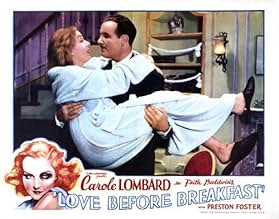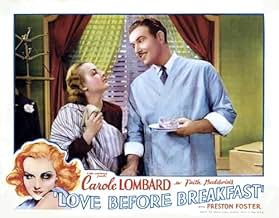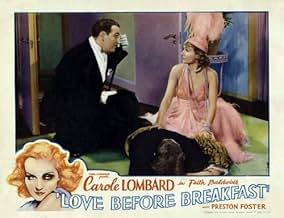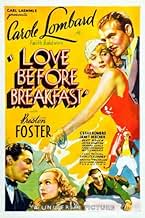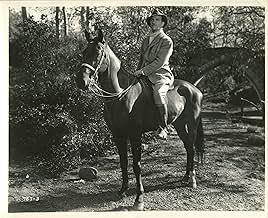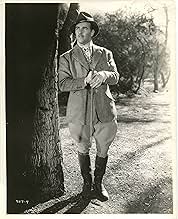IMDb RATING
6.2/10
932
YOUR RATING
A rich businessman stalks another man's fiancée.A rich businessman stalks another man's fiancée.A rich businessman stalks another man's fiancée.
Diana Gibson
- Secretary
- (as Diane Gibson)
George Beranger
- Charles
- (as George Andre Beranger)
Sylvia Andrew
- Secretary
- (uncredited)
William Arnold
- Waiter
- (uncredited)
Jimmy Aye
- Petty Officer
- (uncredited)
Ed Barton
- Jerry - Cabby
- (uncredited)
Jay Belasco
- Undetermined Secondary Role
- (uncredited)
Featured reviews
I love Lombard as much as the next person. What's not to love? But this movie is shocking. I liked Kay Colby for 30 or so minutes, but then, as she became more angry, shrill, and mean, I came to thoroughly dislike the brat. Yet, even drenched, sneezing, and bundled in a too-big bathrobe,running wild and out of control, she's gorgeous, which is apparently why Foster is besotted with her. Her escalating infantile behavior should have been a wake-up call to her suitor that he'd best run for the hills, but instead he rustles up a minister and marries her, while she protests in the marriage vows that she will not obey. I see a quickie Reno divorce hot on the heels of the honeymoon.
Preston Foster is much criticized for not being as charming as Cary Grant, or as attractively domineering as Clark Gable, but I thought his performance was fine. However, the character he played was not so fine. Back in the 30s women may have thought it was romantic to be so desired that a suitor would go to any lengths to win her, but today it looks like stalking. Still, I warmed up to him when he said he was breaking their engagement because he wanted her to be in love with him. This was an interesting plot turn but the scriptwriters fell down on the job by not developing this. Instead, they made Lombard's character unlikeable, and that's not a nice thing to do to any star, let alone Lombard.
Preston Foster is much criticized for not being as charming as Cary Grant, or as attractively domineering as Clark Gable, but I thought his performance was fine. However, the character he played was not so fine. Back in the 30s women may have thought it was romantic to be so desired that a suitor would go to any lengths to win her, but today it looks like stalking. Still, I warmed up to him when he said he was breaking their engagement because he wanted her to be in love with him. This was an interesting plot turn but the scriptwriters fell down on the job by not developing this. Instead, they made Lombard's character unlikeable, and that's not a nice thing to do to any star, let alone Lombard.
Love Before Breakfast features an amusing love triangle between three shallow, selfish characters, played to perfection by Carole Lombard, Preston Foster, and Cesar Romero. Foster, a filthy rich oil baron, "pushes buttons" to have employee Romero, Carole's fiancé, sent to Japan, so he can move in on Carole. Carole is devastated the man she loves is leaving her for two years, but the unworthy object of said love has a hard time hiding his glee at the promotion the overseas job means. Even as his ship sails with poor Carole tearfully waving goodbye, true love Ceasar can be seen at the railing obviously enjoying the attentions of a sexy countess, played with carnivorous exuberance by buxom Betty Lawford. Foster's character is such an egomaniac he smugly brags to Carole about his fiancé-to-Japan manipulation. Thus begins the battle of wills between Carole and Foster that lasts for the rest of this entertaining, witty, little "white telephone movie". They take turns alternately courting and resisting each other with lots of dirty tricks along he way. Both principles have wicked senses of humor. Preston thinks it's hilarious when Carole gets her eye blacked in a night club brawl she engineered. Her get-even prank is to set him up at the local riding club with an evil tempered horse that is sure to throw him. The entire episode at the stable is the funniest in this very amusing picture, except perhaps for the riotous closing scene.
One of the charms of this little comedy is very strong but subtle characterization, thanks to light comedy specialist Walter Lang's expert direction and a script which was surprisingly clever, considering that it seems to have been virtually committee written. Herbert Fields gets credit for the screenplay, but with input from no less than six other writers, including Preston Sturges! Of the Carole Lombard pictures yours truly has seen, this one gives her the best character. In some of her other movies she is just too much of a dizzy dame to be appealing. Especially in My Man Godfrey (1936), in which she's so foolish and childish, she seems almost retarded. In Love Before Breakfast Carole comes off more sophisticated, clever, and witty. Never mind she is spoiled, self-centered, wishy-washy, and lazy -- she lives in a swank apartment with her well-off mother (likeable Janet Beecher) and seems to have never even considered getting a job. And of course Carole is beautiful. Her beauty is well accented by Ted Tetzlaff's gloriously luminous black and white photography, a standout job here even in an era when terrific cinematography is practically taken for granted. The left side of Carole Lombard's gorgeous face was tragically scarred in a late 1920's automobile accident. Even the best of Hollywood makeup couldn't quite cover it, so that special care had to be taken with lighting and camera angles. Tetzlaff washes Carole's closeups in tenebristic shadowing which illuminates only the right side. A generous use of soft focus for her closeups seems to have set the tone for the overall look of the picture, and a very pleasing look it is.
Love Before Breakfast is a typical example of a type of picture called "white telephone movie" in the trade. Younger people, used to telephones of all sizes, shapes, and colors, may not remember, as sadly aged oldblackandwhite does, when nearly every one of them was an unglamorous, utilitarian, flat black. Only rich folks had the glossy white ones that you had to special order and pay extra for on your telephone bill. Hence white telephone movies are about rich guys and rich babes lounging in their ritzy apartments and palatial mansions, going out to glittering night clubs, sailing on their swell yachts, and gabbing on their white telephones. Standard cinema history wisdom portrays this type of movie as especially made for the depressed poor of the Great Depression, who wanted to escape into such fantasies, rather than watch any realistic social melodrama that would remind them of their own distressed lives. The Depression may have made white telephone movies more popular all right, but please note that the same type of picture was very popular in the 1920's, a period of previously unexampled prosperity, and continues to to be popular in various altered forms to this day.
Love Before Breakfast is a solid white telephone job. Charming cast, clever story, plush sets, sensuous cinematography, witty, amusing dialog, fast pacing, and funny gags. A lot of glossy, smooth Old Hollywood entertainment packed into and hour and ten minutes.
One of the charms of this little comedy is very strong but subtle characterization, thanks to light comedy specialist Walter Lang's expert direction and a script which was surprisingly clever, considering that it seems to have been virtually committee written. Herbert Fields gets credit for the screenplay, but with input from no less than six other writers, including Preston Sturges! Of the Carole Lombard pictures yours truly has seen, this one gives her the best character. In some of her other movies she is just too much of a dizzy dame to be appealing. Especially in My Man Godfrey (1936), in which she's so foolish and childish, she seems almost retarded. In Love Before Breakfast Carole comes off more sophisticated, clever, and witty. Never mind she is spoiled, self-centered, wishy-washy, and lazy -- she lives in a swank apartment with her well-off mother (likeable Janet Beecher) and seems to have never even considered getting a job. And of course Carole is beautiful. Her beauty is well accented by Ted Tetzlaff's gloriously luminous black and white photography, a standout job here even in an era when terrific cinematography is practically taken for granted. The left side of Carole Lombard's gorgeous face was tragically scarred in a late 1920's automobile accident. Even the best of Hollywood makeup couldn't quite cover it, so that special care had to be taken with lighting and camera angles. Tetzlaff washes Carole's closeups in tenebristic shadowing which illuminates only the right side. A generous use of soft focus for her closeups seems to have set the tone for the overall look of the picture, and a very pleasing look it is.
Love Before Breakfast is a typical example of a type of picture called "white telephone movie" in the trade. Younger people, used to telephones of all sizes, shapes, and colors, may not remember, as sadly aged oldblackandwhite does, when nearly every one of them was an unglamorous, utilitarian, flat black. Only rich folks had the glossy white ones that you had to special order and pay extra for on your telephone bill. Hence white telephone movies are about rich guys and rich babes lounging in their ritzy apartments and palatial mansions, going out to glittering night clubs, sailing on their swell yachts, and gabbing on their white telephones. Standard cinema history wisdom portrays this type of movie as especially made for the depressed poor of the Great Depression, who wanted to escape into such fantasies, rather than watch any realistic social melodrama that would remind them of their own distressed lives. The Depression may have made white telephone movies more popular all right, but please note that the same type of picture was very popular in the 1920's, a period of previously unexampled prosperity, and continues to to be popular in various altered forms to this day.
Love Before Breakfast is a solid white telephone job. Charming cast, clever story, plush sets, sensuous cinematography, witty, amusing dialog, fast pacing, and funny gags. A lot of glossy, smooth Old Hollywood entertainment packed into and hour and ten minutes.
The film's premise is straightforward: Lombard plays Kay Colby, a young socialite convinced she's in love with Bill Wadsworth (Cesar Romero), a fellow quickly identified as the douche who is all wrong for her. Her Mr. Right is Preston Foster's Scott Miller, who happens to own the oil company Wadsworth works for.
We quickly discover Miller is in love with Colby. He's also manipulative and sneaky, for as the film opens we find Miller is purposefully sending her rather self-centred beau away on assignment on a ship to Japan . And he manages to finagle it so that his own Ms. Wrong, a yappy countess with an entourage of similarly disposed dogs, is going on the same ship. Colby and Wadsworth bump into him (more accurately, they bump into his parked car and then him) at the dock.
So the stage is set for an epic 2nd act featuring the screwball comedy battle of wills, which will steadily escalate in madness and will only let up in the last minute.
The film is not as wicked as 'Mr. & Mrs. Smith', which has very similar sort of screwball formula (sneaky guy pursuing girl as opposed to sneaky girl pursuing guy ala 'Bringing up Baby'), but like that film, this one features Lombard doing what she does best: make you want to kiss and kill her at the same time. She's so good that it makes up for the inadequacies of the leading man, Preston Foster, who is not a good enough listener as an actor to create the sort of chemistry a William Powell or Cary Grant could form with an ugly lamp (see Powell's work in 'My Man Godfrey' opposite Lombard, whom he had not too long before filming divorced!). Foster's all right when we don't have to watch him react to Lombard, but his comic timing and general shtick is uneven. I suspect the director must have figured this out, as the camera is kind in allowing her to create the illusion of a relationship twixt the two a fair amount of the time.
Another interesting phenomenon is the visceral similarity in appearance of the two men (they look alike and both have dark hair with trimmed mustaches) vying for Lombard's Colby, which was aesthetically dissonant for me. I think at the very least one of the staches could have gone, just so douche-bag and good guy don't become perceptually associated in our minds.
The indulgence of quibbles aside, the film's moments of charm and Lombard's mastery of screwball comedy's delectable form of erotica make it well worth seeing if you're fond of the genre.
We quickly discover Miller is in love with Colby. He's also manipulative and sneaky, for as the film opens we find Miller is purposefully sending her rather self-centred beau away on assignment on a ship to Japan . And he manages to finagle it so that his own Ms. Wrong, a yappy countess with an entourage of similarly disposed dogs, is going on the same ship. Colby and Wadsworth bump into him (more accurately, they bump into his parked car and then him) at the dock.
So the stage is set for an epic 2nd act featuring the screwball comedy battle of wills, which will steadily escalate in madness and will only let up in the last minute.
The film is not as wicked as 'Mr. & Mrs. Smith', which has very similar sort of screwball formula (sneaky guy pursuing girl as opposed to sneaky girl pursuing guy ala 'Bringing up Baby'), but like that film, this one features Lombard doing what she does best: make you want to kiss and kill her at the same time. She's so good that it makes up for the inadequacies of the leading man, Preston Foster, who is not a good enough listener as an actor to create the sort of chemistry a William Powell or Cary Grant could form with an ugly lamp (see Powell's work in 'My Man Godfrey' opposite Lombard, whom he had not too long before filming divorced!). Foster's all right when we don't have to watch him react to Lombard, but his comic timing and general shtick is uneven. I suspect the director must have figured this out, as the camera is kind in allowing her to create the illusion of a relationship twixt the two a fair amount of the time.
Another interesting phenomenon is the visceral similarity in appearance of the two men (they look alike and both have dark hair with trimmed mustaches) vying for Lombard's Colby, which was aesthetically dissonant for me. I think at the very least one of the staches could have gone, just so douche-bag and good guy don't become perceptually associated in our minds.
The indulgence of quibbles aside, the film's moments of charm and Lombard's mastery of screwball comedy's delectable form of erotica make it well worth seeing if you're fond of the genre.
My main disappointment with this film is the choice of leading man. Indeed Preston Foster was primarily a straight actor and unaccustomed to romantic comedy. I simply do not see why Carole Lombard's character, Kay Colby would have the slightest temptation to fall in love with Foster's character, Scott Miller, a pushy, egotistical, wiseacre. Perhaps the moral of the tale is that if a man, no matter how obnoxious, pursues a woman long enough, she will give in. The film seems to start out in the middle of the story. No background is given to explain Kay Colby's relationship with either men. And then before you know it one of them is exiled to Japan and disappears from the middle third of the picture.
Now the film does pick up as it goes along and entertains sufficiently with snappy dialog and boisterous incidents. The "storm at sea" scene is particularly satisfying. Perhaps due to the fact that Carole did all her own stunts, taking all the punishment herself and sparing her stand-in. However, the ending is much too abrupt. All the conflict is resolved in the last few seconds of the movie. The characters are not allowed to play out their feelings for us on screen. Perhaps it has all gone on inside their heads, but alas we have missed it. Overall this film is worth seeing once for Lombard fans, but it does not endear and fades quickly from memory.
The popularity of "Love Before Breakfast" was helped at the time from the success of Carole's previous film which was still in theaters, "Hands Across the Table". This film would signal her rise to fame and was a precursor to five straight hits in a row over the next two years.
Now the film does pick up as it goes along and entertains sufficiently with snappy dialog and boisterous incidents. The "storm at sea" scene is particularly satisfying. Perhaps due to the fact that Carole did all her own stunts, taking all the punishment herself and sparing her stand-in. However, the ending is much too abrupt. All the conflict is resolved in the last few seconds of the movie. The characters are not allowed to play out their feelings for us on screen. Perhaps it has all gone on inside their heads, but alas we have missed it. Overall this film is worth seeing once for Lombard fans, but it does not endear and fades quickly from memory.
The popularity of "Love Before Breakfast" was helped at the time from the success of Carole's previous film which was still in theaters, "Hands Across the Table". This film would signal her rise to fame and was a precursor to five straight hits in a row over the next two years.
Last Night I watched A Good Old Fashioned Orgy (2011)a movie that supposedly represents a modern day romantic comedy, I didn't get one laugh and the bevy of actresses in that movie all combined couldn't compare to Carole Lombard.
I love Lombard's movies she's always entertaining as well as strikingly beautiful, this movie came out the same year as "My Man Godfrey" and while this movie can't compare to Godfrey I think Carole with her starring role in this film is more of a showcase for her. The plot is nothing special, spoiled rich girl and powerful businessman go head to head, but it's the performances especially the chemistry between Lombard and Preston that make this movie worth seeing.
I love Lombard's movies she's always entertaining as well as strikingly beautiful, this movie came out the same year as "My Man Godfrey" and while this movie can't compare to Godfrey I think Carole with her starring role in this film is more of a showcase for her. The plot is nothing special, spoiled rich girl and powerful businessman go head to head, but it's the performances especially the chemistry between Lombard and Preston that make this movie worth seeing.
Did you know
- TriviaAlthough Faith Baldwin is credited onscreen as writer of a novel, it was actually just a short story in a magazine. No novel was ever published.
- GoofsAbout 5 minutes into the movie, a horse-drawn taxi backs into a car & damages it's left headlight but in the next scene, it is the right headlight that is damaged & even more so.
- Quotes
Kay Colby: Incidentally, what's happened to the Count? Where is he?
Scott Miller: Where are the snows of yesteryear?
Kay Colby: Where the woodbine twineth.
Scott Miller: That's where the Count is.
- Crazy creditsCard after ending credits: "Thank You"
- Alternate versionsThere is an Italian edition of this film on DVD: " LA BISBETICA INNAMORATA (1938) + FESTA D'AMORE (1945)", distributed by DNA Srl (2 Films on a single DVD), re-edited with the contribution of film historian Riccardo Cusin. This version is also available for streaming on some platforms.
- ConnectionsReferenced in Hollywood Hist-o-Rama: Carole Lombard (1961)
- SoundtracksThe Old Gray Mare
(uncredited)
Traditional
Sung by the college boys after the brawl
- How long is Love Before Breakfast?Powered by Alexa
Details
- Runtime1 hour 10 minutes
- Color
- Aspect ratio
- 1.37 : 1
Contribute to this page
Suggest an edit or add missing content


